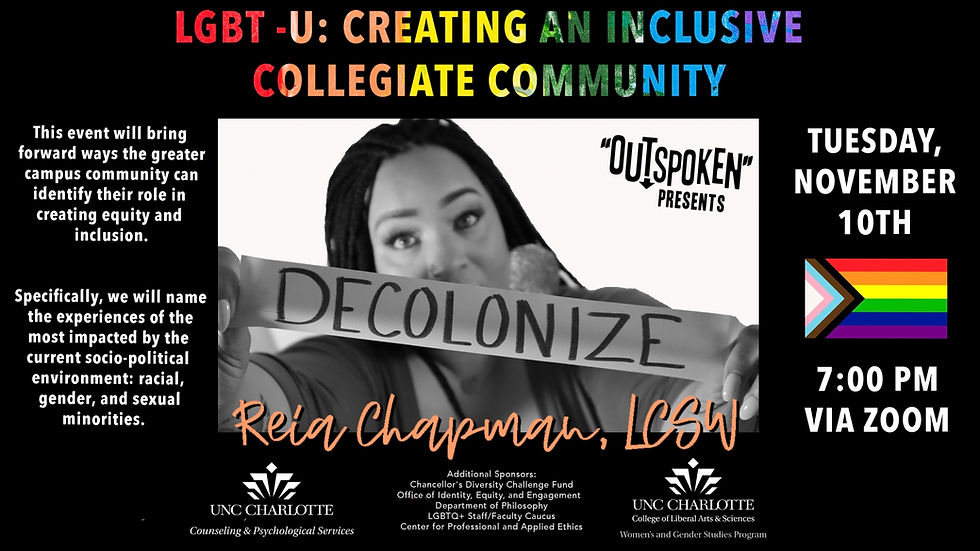Happy Social Workers Month 2018! – Q&A with Reia Chapman
- Reia Chapman, LCSW, LISW-CP
- Mar 29, 2018
- 3 min read
by Christina Adeleke
Did you know that every March is Social Workers Month? Social Workers Month is the time where we shine the spotlight on the profession and highlight the important contributions that social workers make to our society. Social workers encounter some of the most difficult issues facing individuals and families and work tirelessly to find solutions to help people become their best and fullest version of themselves.
To learn more about social workers and their role in advocacy and in the community, we spoke with Reia Chapman, MSW, LISW-CP, LCSW, the Founder and Director of Clinical Programs at theCenter for Family and Maternal Wellness in Charlotte, North Carolina. Reia is a professional social worker, activist, organizer, and psychotherapist. She holds a Bachelor of Science degree in Psychology from the University of North Carolina at Charlotte and a Master of Social Work degree from Savannah State University, a Historical Black University.

To learn more about social workers and their role in advocacy and in the community, we spoke with Reia Chapman, MSW, LISW-CP, LCSW, the Founder and Director of Clinical Programs at theCenter for Family and Maternal Wellnessin Charlotte, North Carolina.
Reia is a professional social worker, activist, organizer, and psychotherapist. She holds a Bachelor of Science degree in Psychology from the University of North Carolina at Charlotte and a Master of Social Work degree from Savannah State University, a Historical Black University.
She has an extensive background as a professional organizer and activist across the intersections of Reproductive Health, Rights, and Justice, as well as Racial and Social Justice, and has been instrumental in laying the groundwork for some of the most powerful organizing happening in North Carolina and across the Southern Region of the United States.
Reia is licensed to practice Clinical Social Work in both North Carolina and South Carolina and coined the phrase “social workISsocial justice work.” Embodying both a calling and a commitment to collective liberation, justice and mental and emotional wellness, she founded the Center for Family & Maternal Wellness, an outpatient psychotherapy practice, in March 2016. Reia is a Gottman trained therapist specializing in treating couples in distress.
What role has your childhood and upbringing had on your decision to become a social worker?
I would say that social work found me. When I was younger, I thought I was going to become a surgeon and my parents thought I would become an attorney. I initially thought that I wanted to be a social worker because all of the people in my life always told me about their problems, but my life experiences definitely led me to my work today. As a child, I was displaced and placed into the system after witnessing poverty, violence and substance abuse in my home. Having to learn how to navigate the criminal justice system and substance abuse programs had a significant impact on my path to becoming a social worker.
What gaps do you see in the social work field and what impact does that have on the community?
Especially if you work for a large government agency like the Department of Social Services (DSS), social workers have really large caseloads, which in turn, renders them to be ineffective because they are too busy managing paperwork instead of spending time with their clients, in addition to there not being enough social workers to begin with. Another issue that needs to be addressed is access to healthcare and managed care services. Most people cannot afford the out of pocket therapy costs without insurance. Even people with insurance experience barriers to care because they cannot always afford their high deductibles and copays. Even larger organizations that service low-income clients have incredibly long waiting lists, which is a problem because that person is already distressed and may need those services now instead of three months from now. A lot can happen in a person’s life in that period of time.
How would you describe the role of a social worker in advocacy?
In the Social Workers Code of Ethics, we are charged with advocating for the most marginalized in our community. Being a social worker comes with a certain power and privilege because social workers have a lot of access to places that others do not and because you have credentials, people believe you when you tell them something. Because of that privilege, social workers must address people in need and those in need of services while pursuing social justice, including in areas of poverty and discrimination. Social workers also play a role to play in raising the social awareness of their communities. They can show their communities that people who are unemployed are not “lazy,” but may have health issues or other barriers to gaining employment.
Read the full article HERE




Comments